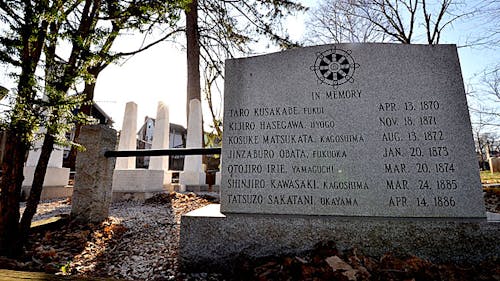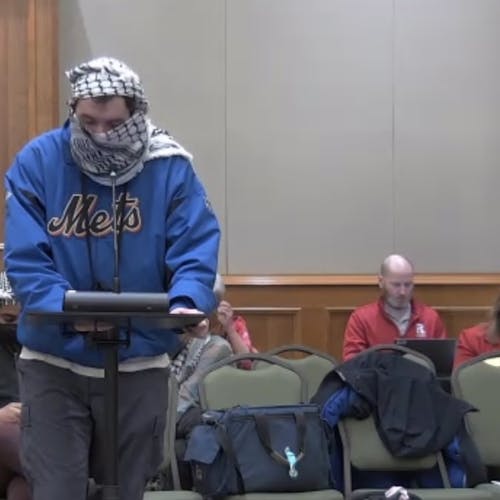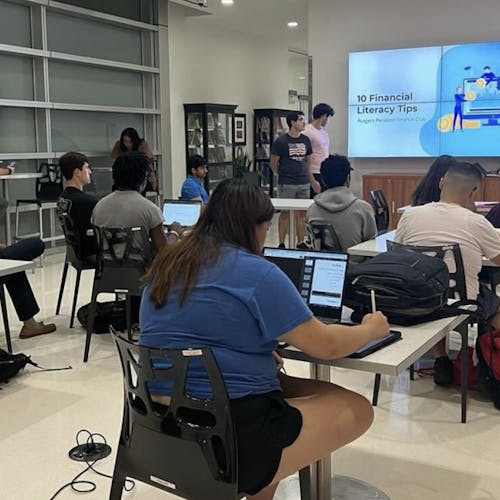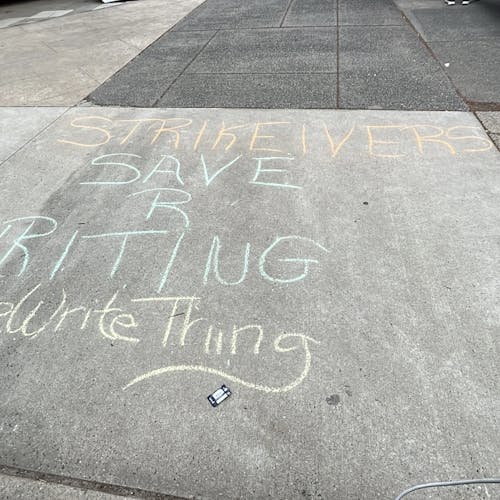U., city hold old ties with Japan

The University and city of New Brunswick have a strong connection with Japan, suffering the catastrophic effects of the March 11 earthquake and tsunami, dating back to the 1860s.
One of the first Japanese nationals to graduate from an American college graduated from the Rutgers College in 1870, and New Brunswick has two of its four sister cities in Japan.
Kusakabe Taro, a samurai from Fukui, Japan, entered Rutgers College in 1867 as a sophomore, and became the first Japanese student in America to be accepted to Phi Beta Kappa, the nation's oldest academic honor society. He was also No. 1 of the class of 1870, said Fernanda Perrone, curator of the University Libraries' William Elliot Griffis Collection.
Taro, who was chosen to attend Rutgers College due to his noble background and intelligence, studied primarily science and mathematics to bring back new technology to Japan, she said. But he also studied other required subjects like English and philosophy.
"He had these really hard courses, but he was still No. 1," Perrone said.
But Taro was not the first Japanese student on campus. The University was tied to the Rutgers Grammar School, now the Rutgers Preparatory School, which at the time was in Alexander Johnston Hall on the College Avenue campus, she said.
There were many Japanese students who attended the grammar school, rather than the college, for their English was not good enough.
"The people that were sent here at that time were the top scholars, so they were from different places … The purpose for them to come here was to realize they were really behind the rest of the world economically, technologically, etc.," said Nobuko Hori, a University alumna who graduated in 2010 with a degree in East Asian studies, concentrating in Japanese studies.
The Japanese students made an impression on the Rutgers College men at the time, and it was an enriching experience connecting with them, Perrone said.
"I think [the Japanese students] were more considered to be exotic," she said.
Japan had been closed to the West for many years, and the United States wanted to open trade with Japan. When the ruling feudal lords decided to send students to study in the West, they chose Rutgers College because of its strong ties with the Dutch Reformed Church, which founded Rutgers College and had missionaries in Japan, Perrone said.
"Even though the seminary was separate from the college, there was still a strong connection," she said.
And the connection continued even after Taro's death on April 13, 1870.
Taro died of tuberculosis at the age of 25, a few weeks before graduation, and his degree was awarded posthumously. Rutgers College closed school for his funeral, which was held in the Second Reformed Church, and he was buried in the Willow Grove Cemetery on Livingston Avenue in a special Japanese section — one of the oldest in the nation, said Jane Tublin, director of International Programs for the City of New Brunswick and Sister Cities International.
After his death, Taro's tutor, William Elliot Griffis, whose collection of documents can be found in the Alexander Library on the College Avenue campus, became one of the West's foremost experts on Japan.
Griffis, who also helped to found The Daily Targum and the New Brunswick Theological Seminary, established a science school in Fukui and taught Japanese students there and in Tokyo for four years. He penned many textbooks and documents detailing Japanese life and culture to the English-speaking world. When Griffis died in 1928, his family donated his documents to the University.
After Griffis' death, though, the relations with Japan persevered. Japanese students did flock to the Hub City, but this tapered in the first half of the 20th century with the world wars and establishment of Japanese institutions of higher education.
"It is true that for awhile, there really wasn't a lot of back and forth between the United States and Japan … because the relationship between Japan and the United States has been mixed," Hori said.
But because of these exchanges, however infrequent, between the cities, New Brunswick became a sister city with Fukui in 1982.
The relationship mainly benefits University and Japanese students through an exchange program, Tublin said.
"Part of this focus is on students because it was a student who first came here," she said.
Hori studied in Kyoto in the spring of 2009.
"I think both of those ties — the Rutgers and the sister cities ties — has made Rutgers and New Brunswick very receptive to Japanese students studying here," she said.
Hori said the University's prestige overseas has kept Japanese students interested in attending a top public state college, while the University is also proud of its long history with the nation and wants to maintain it.
"I feel really fortunate that Rutgers does have the strong Japanese connection. That was really important to me and something I continue to be involved in," said Hori, who was involved in Japanese organizations on campus.
But Fukui was not the first sister city for New Brunswick — in 1960, New Brunswick joined with Tsuruoka, Japan, Tublin said.
The city first made contact with Tsuruoka in 1869, when Saburo Takagi, who was from a small town in northwest Japan, went to Rutgers Grammar School to help other students. He later became one of the first members of the Japanese consulate, she said.
After several more exchanges between the cities, the Rotary International organizations of both cities signed the agreement on June 10, 1960, Tublin said.
Tublin said the purpose of these relationships is to learn about similar cities in different parts of the world, build relations and provide educational opportunities.
The New Brunswick Sister Cities Association raises funds from the community every three to four years to send a small group of cities to Japan, Tublin said.
But the other goal of Sister Cities is to help each other out in dire circumstances.
Both Fukui and Tsuruoka were not destroyed or majorly impacted by the recent disasters in Japan. Fukui received no damage, and Tsuruoka had shaking and some waves, Tublin said.
Tsuruoka has gas, electricity and food, but they are experiencing rolling blackouts like much of the country to preserve energy, Tublin said.
Hori, who also volunteers with Sister Cities, said fortunately, her family and friends in Japan are safe.
"I don't personally know anybody that's been affected, but it is really emotional to be witnessing right now," Hori said.
She said the Japanese are known to be strong and have a tendency to persevere.
"But still, especially with all the problems with the nuclear power plant, it is really scary because not many people know what the dangers are," Hori said.
One of the lessons she takes from her studies at the University is how Americans and the Japanese see society differently — the former has a more individualistic view, and the latter, a more communal view.
The Japanese see themselves as connected together and part of a whole greater than themselves, thus they often rely on one another for support, Hori said.
She said this is lending to the way the country is facing the crisis.
"People who are far away and safe are still very concerned, and people who are closer are pitching in to help," Hori said. "But it is reassuring how so many people from so many countries have stepped up and stepped in."



